
MOLECULAR REPRODUCTION AND DEVELOPMENT
Scope & Guideline
Innovating methodologies to illuminate molecular mechanisms.
Introduction
Aims and Scopes
- Molecular Mechanisms of Reproduction:
Research in this area investigates the molecular and cellular processes involved in gametogenesis, fertilization, and early embryonic development. This includes studies on gene expression, signaling pathways, and the roles of specific proteins and RNAs. - Comparative Reproductive Biology:
The journal emphasizes comparative studies across different species, providing insights into the evolutionary aspects of reproduction and development. This includes examining reproductive strategies, gamete interactions, and embryonic development in various taxa. - Impact of Environmental Factors on Reproductive Health:
Research addressing how environmental factors, such as endocrine disruptors, temperature, and nutrition, affect reproductive outcomes and developmental processes is a significant focus. This includes studies on how these factors influence gene expression and reproductive physiology. - Innovative Reproductive Technologies:
The journal publishes studies on advanced reproductive technologies, including assisted reproductive techniques, genetic editing, and novel methodologies for embryo culture and assessment. This encompasses both animal models and human applications. - Pathophysiology of Reproductive Disorders:
Research into the mechanisms underlying reproductive disorders, such as polycystic ovary syndrome, infertility, and developmental defects, is central to the journal. This includes exploring genetic, epigenetic, and environmental contributions to these conditions.
Trending and Emerging
- Role of Extracellular Vesicles in Reproduction:
Research on extracellular vesicles, particularly their roles in communication during fertilization and early embryo development, is gaining traction. These studies highlight the importance of intercellular signaling in reproductive processes. - Epigenetic Regulation in Reproductive Health:
An increasing number of studies are investigating epigenetic modifications and their impact on reproductive outcomes. This includes exploring how environmental factors influence epigenetic changes in gametes and embryos. - Application of Advanced Imaging Techniques:
The use of novel imaging technologies, such as time-lapse imaging and optical coherence tomography, is trending. These techniques facilitate real-time observation of gametes and embryos, enhancing our understanding of developmental dynamics. - Integrative Omics Approaches:
Emerging research increasingly utilizes multi-omics approaches (genomics, transcriptomics, proteomics) to provide comprehensive insights into reproductive biology. This trend reflects a move towards understanding complex biological systems in a holistic manner. - Impact of Microbiome on Reproductive Health:
Investigation into the role of microbiota in reproductive health is on the rise. Studies are beginning to explore how microbial communities affect fertility and pregnancy outcomes, indicating a growing interest in the intersection of reproductive health and microbiology.
Declining or Waning
- Traditional Embryology Techniques:
There has been a noticeable decrease in studies focusing solely on traditional embryology methods without integrating molecular insights. As the field moves towards more molecular and genomic approaches, papers emphasizing classical techniques seem to be diminishing. - Species-Specific Studies:
Research focusing exclusively on single species without comparative analysis appears to be less frequent. The trend is shifting towards more integrative studies that compare reproductive mechanisms across multiple species, reflecting a broader interest in evolutionary biology. - Basic Descriptive Studies of Gametes:
While foundational studies on gamete structure and function remain important, there is a waning interest in purely descriptive work without molecular or mechanistic insights. The field is increasingly favoring research that connects basic observations to functional implications.
Similar Journals

Plant Reproduction
Exploring the Future of Plant Reproductive BiologyPlant Reproduction is an esteemed academic journal published by Springer, dedicated to advancing the understanding of reproductive processes in plants. With its ISSN 2194-7953 and E-ISSN 2194-7961, this journal serves as a vital resource for researchers and professionals in the fields of cell biology and plant science. Since its inception in 2013, it has been recognized in the Q1 Quartile for plant science, underscoring its significance and impact within the academic community, while maintaining a ranking of #79/516 in the Scopus database for agricultural and biological sciences. The journal embraces an Open Access model, enhancing accessibility for a broader audience of scholars and practitioners. As we continue to converge our research efforts towards 2024 and beyond, Plant Reproduction remains committed to exploring innovative findings and fostering collaboration in plant reproductive biology, thereby contributing significantly to the global understanding of plant systems and their ecological impacts.
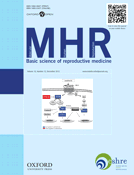
MOLECULAR HUMAN REPRODUCTION
Exploring the Molecular Frontiers of Human ReproductionMOLECULAR HUMAN REPRODUCTION, published by Oxford University Press, is a pivotal journal dedicated to advancing the field of reproductive biology. Since its inception in 1995, the journal has been recognized for its rigorous peer-reviewed research and substantial contributions to the understanding of molecular mechanisms underlying human reproduction. With an impressive impact factor and ranked within the top tiers (Q1 and Q2) across diverse categories including Embryology, Obstetrics and Gynecology, and Reproductive Medicine, it stands as an essential resource for researchers, healthcare professionals, and students alike. The journal aims to publish cutting-edge research that explores the complexities of human reproduction at the molecular and cellular levels, fostering a deeper understanding that can be translated into clinical practice. Although it currently operates under a subscription model, the valuable insights and groundbreaking findings featured within its pages continue to influence the trajectory of reproductive health research globally. Located in the heart of Oxford, United Kingdom, the journal remains committed to addressing vital challenges in the field and promoting innovative scientific dialogue.
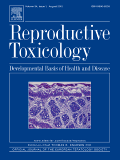
REPRODUCTIVE TOXICOLOGY
Delivering high-impact insights into toxicology and reproduction.REPRODUCTIVE TOXICOLOGY, published by Pergamon-Elsevier Science Ltd, stands as a pivotal journal in the field of toxicology, specifically focusing on the effects of environmental and pharmaceutical agents on reproductive health. Established in 1987, the journal has a rich history of contributing to the scientific community, and it continues to publish rigorous research and reviews that illuminate the intricate relationships between various toxicants and their reproductive impacts. With an impressive 2023 Q2 ranking in Toxicology and a Scopus ranking of #42 out of 133 in the Toxicology category, REPRODUCTIVE TOXICOLOGY emphasizes high-quality scholarly work that influences both academia and industry practices. Researchers, professionals, and students in toxicology, pharmacology, and public health will find this journal an invaluable resource for staying informed on the latest findings and methodologies in reproductive toxicology. While the journal currently adheres to traditional publishing models without open access options, its authoritative content remains accessible to a global audience interested in advancing the understanding of toxicological impacts on reproduction.
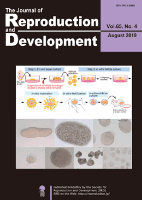
JOURNAL OF REPRODUCTION AND DEVELOPMENT
Empowering research in reproduction and development.JOURNAL OF REPRODUCTION AND DEVELOPMENT, published by the SOCIETY REPRODUCTION & DEVELOPMENT-SRD in Japan, is a leading peer-reviewed journal dedicated to advancing the field of reproduction and development in animal sciences. With a notable impact factor reflected in its prestigious Q1 Quartile ranking in Animal Science and Zoology, the journal aims to disseminate cutting-edge research that explores the complexities of reproductive biology, developmental processes, and their implications for agriculture and biodiversity. This journal invites contributions that span multidisciplinary interests, thereby facilitating the integration of scientific knowledge and practical applications. Researchers, professionals, and students can benefit from the insights shared within its pages, as it strives to foster collaboration and innovation in the field. The journal’s comprehensive scope and esteemed reputation, underscored by its Scopus rank of #115 out of 490 in the category, make it an invaluable resource for anyone invested in the study of reproduction and development.
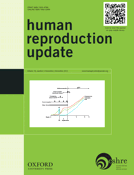
HUMAN REPRODUCTION UPDATE
Your Gateway to Cutting-edge Reproductive ResearchHUMAN REPRODUCTION UPDATE, published by Oxford University Press, stands as a leading journal in the fields of Obstetrics and Gynecology and Reproductive Medicine. With an impressive Q1 ranking in both categories according to the 2023 category quartiles and a significant Scopus rank, it is recognized as one of the top journals globally in these disciplines, catering to the most relevant and cutting-edge research. The journal has been a crucial platform for disseminating vital findings and reviews from 1995 to 2024, contributing to advancements in human reproductive health. With its focus on publishing high-quality, peer-reviewed articles, it serves as an essential resource for researchers, healthcare professionals, and students seeking the latest insights and developments in reproductive science. As the journal aims to foster informed discussions and encourage further research, it remains committed to shaping the future of reproductive health and medicine.
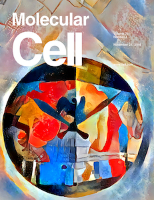
Molecular Cell
Pioneering Discoveries in Cell and Molecular Biology.Molecular Cell, published by Cell Press, is a leading journal in the fields of cell biology and molecular biology. Established in 1997, this prestigious journal boasts a significant impact within the scientific community, evidenced by its impressive 2023 Scopus rankings, placing it in the top 2% of its field (Rank #10/410 in Molecular Biology, Rank #12/285 in Cell Biology). With a focus on cutting-edge research that bridges the gap between molecular genetics and cellular function, Molecular Cell serves as an essential platform for the dissemination of vital findings and innovative methodologies. Although it follows a traditional publishing model without Open Access options, its rigorous peer-review process and high standards ensure that articles published within these pages are of the utmost quality, making it an invaluable resource for researchers, professionals, and students alike seeking to stay at the forefront of scientific discovery. The journal's address is 50 Hampshire St, Floor 5, Cambridge, MA 02139, United States, reinforcing its commitment to fostering scientific excellence and collaboration.

THERIOGENOLOGY
Connecting practitioners and researchers in the realm of animal health.THERIOGENOLOGY is a prestigious academic journal published by Elsevier Science Inc, dedicated to the field of veterinary reproduction and animal science. With an impressive impact factor and recognized as a Q1 journal in various categories including Animal Science and Zoology, Equine, Food Animals, and Small Animals, THERIOGENOLOGY has established itself as a vital resource for researchers, practitioners, and students alike. Founded in 1974, the journal covers a broad spectrum of topics related to reproductive physiology, biotechnology, and the health management of food and companion animals. Although it does not currently offer open access, researchers can benefit from its comprehensive articles and reviews that push the boundaries of knowledge in veterinary science. With a significant placement in the Scopus rankings, ranking #1 in multiple veterinary categories, THERIOGENOLOGY serves as an essential platform for advancing the understanding of reproductive strategies and practices, thereby contributing directly to the fields of animal husbandry and veterinary medicine.

JOURNAL OF PLANT BIOLOGY
Exploring the Depths of Plant BiologyJOURNAL OF PLANT BIOLOGY, published by SPRINGER HEIDELBERG, is a leading academic journal dedicated to advancing the field of plant science. With an impressive impact factor signifying its high citation rate and rigorous peer-review process, this journal ranks in the Q1 category within Plant Science, placing it among the top-tier periodicals in the discipline. Established in 1999, it has become an essential resource for researchers, professionals, and students seeking the latest findings and developments in plant biology. The journal fosters a collaborative environment for sharing innovative research, exploring ecological interactions, and understanding plant physiology, thereby contributing significantly to advancements in sustainable agriculture and environmental conservation. Its high Scopus ranking of 102 out of 516 in the category of Agricultural and Biological Sciences further underscores its relevance and impact within the scientific community. For those interested in cutting-edge research, JOURNAL OF PLANT BIOLOGY is a vital source of knowledge, offering insights that are crucial for the future of plant science.

Reproductive and Developmental Medicine
Fostering collaboration in reproductive and developmental research.Reproductive and Developmental Medicine is a pioneering open-access journal dedicated to advancing knowledge in the fields of reproductive medicine and developmental biology. Published by LIPPINCOTT WILLIAMS & WILKINS, the journal serves as a platform for researchers, clinicians, and graduate students alike, fostering collaboration and dissemination of innovative research findings. With an ISSN of 2096-2924 and E-ISSN 2589-8728, it has established a significant presence in the academic community since its inception in 2017. The journal is indexed in Scopus and achieved a category quartile ranking of Q3 in Obstetrics and Gynecology and Q4 in Reproductive Medicine as of 2023, highlighting its importance as a resource for cutting-edge studies and reviews in these vital areas. The journal's open-access model ensures that research is readily available to scholars and practitioners worldwide, thus enhancing the global discourse in reproductive health and development. This makes Reproductive and Developmental Medicine an invaluable resource for those dedicated to improving outcomes in obstetrics, gynecology, and reproductive health.
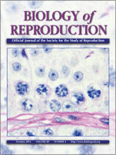
BIOLOGY OF REPRODUCTION
Advancing the Frontiers of Reproductive ScienceBIOLOGY OF REPRODUCTION is a premier journal published by Oxford University Press Inc, dedicated to advancing research in the fields of reproductive biology, cell biology, and reproductive medicine. With an impressive impact factor and a strong ranking as Q1 in reproductive medicine and miscellaneous medicine, as well as Q2 in cell biology, this journal offers a vital platform for disseminating innovative findings and pivotal studies that shape our understanding of reproductive processes. Since its inception in 1969, BIOLOGY OF REPRODUCTION has become a key resource for scientists, clinicians, and students alike, providing insights that drive the future of reproductive health and research. Although not an open-access publication, it remains a respected authority, reflecting a commitment to high-quality peer-reviewed articles. The journal's comprehensive scope includes molecular and cellular aspects of reproduction, reproductive health, and associated technologies, making it indispensable for professionals looking to stay at the forefront of breakthroughs within the field.